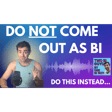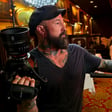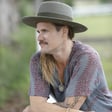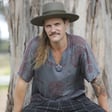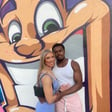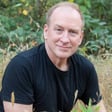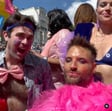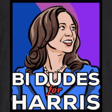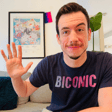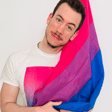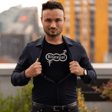Become a Creator today!Start creating today - Share your story with the world!
Start for free
00:00:00
00:00:01

The Science of Bisexuality with Dr. Julia Shaw (Season Finale)
Interested in sponsoring this show or podcast ads for your business? Go to https://zen.ai/twobiguys0 and fill out the contact information so Zencastr can help you bring your business story to life.
It's the Two Bi Guys Season Four Finale and it's jam-packed with bi science, bi history, bi culture, bi politics, and of course bi puns! We are thrilled to be joined by Dr. Julia Shaw, psycholoical scientist at University College London, founder of the Bisexual Research Group, and author of multiple best-selling books -- including her new book "Bi: The Hidden Culture, History, and Science of Bisexuality", coming out June 28 in the US!
We chatted about Dr. Shaw's bi identity and how a lack of research about bisexuality led to her exploring on her own and coming out, why bisexual people frequently "want more" (and deserve more!), the privilege of being in a place and position where coming out is safe (and the responsibility that comes with it), why psychological research has often marginalized fluid sexuality and why the field of "positive psychology" offers new promise, how traditional evolutionary theory comes up short in its explanation of queerness and why multi-spectrum attraction is not only natural but likely evolutionarily advantageous, the deep and often-invisible cultural bias toward heterosexuality that most of us grew up with, how positive Bi+ & queer representation in media can contribute to meaningful, real-world political change, Dr. Shaw's six stages of "bidentity" development (spoiler: it begins with loneliness but ends with peace!), and the importance of Bi+ spaces and BI PRIDE!
Thank you all for listening to another season of Two Bi Guys! Happy Pride and we'll be back soon!
Dr. Shaw's website: https://www.drjuliashaw.com/
Order Dr. Shaw's book! (and find Bi+ events w/ Dr. Shaw): https://linktr.ee/drjuliashaw
The Bisexual Research Group: https://www.bisexualresearch.com/
Follow Dr. Shaw on Twitter: https://twitter.com/drjuliashaw
Follow Dr. Shaw on IG: https://www.instagram.com/drjuliashaw
Follow the Bisexual Research Group on Twitter: https://twitter.com/bisexualscience
Follow the Bisexual Research Group on IG: https://www.instagram.com/bisexualresearch/
Two Bi Guys is produced and edited by Rob Cohen
Created by Rob Cohen and Alex Boyd
Logo art by Kaitlin Weinman
Music by Ross Mintzer
We are supported by The Gotham
Made on Zencastr #MadeOnZencastr
You can get 30% off Zencastr for 3 months with promo code: twobiguys -- or just click this link: https://zencastr.com/pricing?coupon=twobiguys&fpr=ex42o. Start recording your own podcast or meetings today!
Transcript
Introduction to Two By Guys and Zencaster
00:00:00
Speaker
Hi everyone, welcome, I'm Rob, this is Two By Guys. But first, and in case you've been living under a rock, Two By Guys is now part of the Zencaster creator network, and Zencaster is recruiting brands who want to advertise on independent podcasts like this one. Zencaster's team doesn't rely on traditional user ad tracking, instead they match your brand to the perfect podcasts using context. So whether you want to advertise on a queer relationship podcast like this one,
00:00:28
Speaker
or maybe a podcast about video games or gardening or hiking or politics or whatever is relevant to your brand, you can find the perfect fit in the Zencaster Creator
Monetizing Podcasts: Success Stories
00:00:38
Speaker
Network. Zencaster's mission is to make podcast advertisements as easy and accessible to business owners as Google or Facebook ads. And Zencaster's new podcast marketplace allows brands and podcasters to negotiate directly, to collaborate, to improve the success of each ad dollar spent, and to form long-term relationships.
00:00:57
Speaker
Zengaster has already proven that with the right fit, ads on smaller podcasts can outperform ads on bigger ones in a variety of verticals, allowing them to work with all podcasters. Zengaster Creator Network has really helped me as a podcast. Even though we're not one of the biggest podcasts out there, we do have a loyal following of people who are very engaged with our content. Thank you all for listening. I see you. I love you.
00:01:21
Speaker
And because of that, I'm able to monetize the work I'm doing now, even on this medium-sized scale, which allows me to keep the podcast going. And Zencaster partners me with brands that I have an authentic interest in, so it's a win-win. Podcasts on the Zencaster Creator Network reach dedicated listeners and will give your brand a chance to connect with consumers in a way that traditional advertising can't.
00:01:45
Speaker
So are you interested in sponsoring this show or podcast ads for your business? Go to zen.ai slash to buy guys zero and fill out the contact information so Zengaster can help you bring your business story to life.
Interview with Dr. Julia Shaw: Bisexuality and Identity
00:02:13
Speaker
Hello and welcome to Two Bye Guys. I'm Rob and I'm here with a very special guest today, a bisexual researcher and influencer and activist, Dr. Julia Shaw. Welcome to Two Bye Guys. Nice to be here.
00:02:28
Speaker
So nice to have you after I've been reading your tweets and consuming your output for many years. So Dr. Julia Shaw is a psychological scientist at University College London. She is the author of multiple best-selling books. She's a BBC science communicator. She's best known for her work in the areas of false memory, criminal psychology, and bisexuality.
00:02:52
Speaker
And her third book is coming out this summer, 2022. It's called By the Hidden Culture, History, and Science of Bisexuality. The book is an eye-opening, rigorous, and personal exploration of sexuality, which we're going to talk about. I had a chance to skim through the book, and there are many, many things to discuss. It's quite comprehensive.
00:03:14
Speaker
And Dr. Shah is also the founder of the Bisexual Research Group, and she is part of queer politics at Princeton University. So welcome again to Two Bye, guys. So nice to have you. So nice to be here. I've listened to many of the episodes of this podcast, and I always enjoy the people that you have on. So it's very nice to join a good group of people.
00:03:35
Speaker
That's awesome. Yeah, well, I'm very interested in this kind of work. So it makes sense. There's a lot of overlap because I was a psychology major in college and I like almost really went down that route in some ways I sort of have without realizing it. And the other route I went is is stuff you have experience with to with media and film and TV. And so we'll have a lot to talk about. We'll have way too much that we
00:04:00
Speaker
can't get through in the podcast. So everyone buy the book when it comes out. So before we get into the book, can you tell us first, like, how do you identify what pronouns do you use? And like, how did you come to that identity, whatever labels you like to use? So I identify as a bisexual woman with she her pronouns. And I have
00:04:22
Speaker
identified as bisexual since I was a teenager. So basically I've never had a different, since I've had a label at all, I've never had a different one. I think there was a while when I was sort of in my early teens that I probably wouldn't have used the word by, but I wouldn't have used any word. So I think that's fair. Um, but I did come out as bi to my mom almost by accident when I was a teenager because she noticed that I was in a relationship with a, another girl
00:04:49
Speaker
And she sat me down on this blue couch that we had at the time. And she's like, so I noticed you've been spending a lot of time with, you know, her name. And you know, it doesn't matter. It's fine. But like, are you a lesbian? And so that was almost a forced moment, right? Where I was like, well, no, but I needed to then label it. And so I think that was the moment where I was probably about 15. I labeled it as bi. And yes, I've identified as bisexual ever since.
00:05:17
Speaker
That's interesting. It's funny, Alex, my co-host, isn't here, but he has a very similar story of his parents confronting him at around age, I think, 14 or 15. But at that time, he didn't have the buy knowledge in his head to even realize that's what I should say or that's what I might be. So his parents asked, are you gay? And he just said, yeah. And then for years, he had kind of got pushed into that
00:05:44
Speaker
gay label, and it took him a while to realize bias. So I guess I'm curious, like so many, so many people, bisexuality is quite invisible, often until later in life. How do you think you realized it so early? Like what clued you in in your upbringing?
00:06:02
Speaker
That's an excellent question. And I actually don't really know the answer to that. So I grew up in a very queer city. So I grew up in Cologne, which is in Germany, which is a like a queer hub. It is absolutely since it turns out now that I know my queer history, since like 1900, it's been just like a safe place for queer people. I mean, firing
00:06:22
Speaker
few years of Nazi reign. But other than that, it's I mean, it was literally where people would escape to from places like the UK, they would go to Cologne. And that is something that I obviously wasn't aware of when I was a kid. But I think there's this long, long history of pride events, of Christopher Street Day, as we call it in Cologne, and related, just a queer scene.
00:06:42
Speaker
And so I think through that I sort of absorbed it, even though I don't know any family friends. I didn't have any friends at the time who identified us by. So it wasn't that there was like a person or a role model I could point out and say, Oh, I'm like them. It was more that I wasn't the other two labels. So I have to be this one because labels like pan and fluid and all these things weren't really around when I was when I was a kid.
00:07:08
Speaker
Right. Interesting. That makes sense. I mean, I can see that how it could just be kind of in the ether and it gets into you without anything explicit. So then you told your mom at age 15, and then like, what happened after that? How'd you get from there to like, by activist and by research group? Like, when did you start coming out and making this a part of your career?
00:07:34
Speaker
much later. So I was out to my partners and most of my friends for most of my university life and later but I wasn't out at work and I wasn't out publicly and when I started to build a social media profile I wasn't out there either.
00:07:51
Speaker
until I was, until I decided in my second book to come out. And my second book is on evil and criminal psychology. And it's sort of a tongue in cheek title, because the whole idea is that evil is the thing that I'm trying to deconstruct with the book. And it's actually a word that I really don't like us using because it dehumanizes others.
00:08:13
Speaker
And within that, I had a section on how some people perceive LGBT plus people and lives as evil. And so within that, it was sort of the consensus seems to be that one of the main things we can change is visibility. And visibility often leads to and is related to legal changes that protect our human rights. And so I was writing this and I was writing about how
00:08:36
Speaker
almost the ridiculousness of seeing these identities as evil, but also trying to empathize with that perspective. Simultaneously, I was like, and I was like, be visible. And then I actually write, I'm like, I'm such a hypocrite. So I wrote in the book that I'm being a hypocrite because I wasn't visible. And so who am I to say be visible if I'm still in the closet? Like what kind of advice is that? And so I came out in the book and that was also, I had a long conversation with my editor about this.
00:09:03
Speaker
because I was so worried about being hypersexualized as a, because I'm already a, or certainly was at that point, a young female academic, and I was in the public eye. And as a young woman on the internet, we're all familiar with, well, the internet and the trolls that live there. And unfortunately, and unfortunately, I was being sexualized already. And so I was very, very conscious of
00:09:30
Speaker
not making it worse. And so that's one of the conversations we had is, is this going to make the internet unbearable for me? And it didn't. The outcome was very good. But I was very concerned about that. Interesting.
00:09:44
Speaker
Yeah, well, good for you. And that's so cool that the things you realized in the book kind of pushed you to come out yourself. I have a question about identity and bisexuality, and something you said made me think of the invisibility of bisexuality in this. It's
00:10:02
Speaker
other things can be all-consuming. I have a quote from your book I want to ask you about. You wrote, we center heterosexuality as the son of our sexual solar system, blinding our exploration of other sexualities. I don't think that everybody is bi, as I so often half-jokingly state. Rather, I believe it is time to queer our worldview by destabilizing our assumptions about sex and sexuality. So I guess I'm curious, like,
00:10:28
Speaker
I love the word bisexual too, and it's the first word I usually use in addition to others like queer or fluid, but it does feel like it's very rooted in this moment. The word bisexual is like anti-heterosexual, which is all-encompassing.
00:10:48
Speaker
How do you see this identity? Do you see it like shifting in the future? Do you see like a no labels world as the future or like, I don't know, how do you think about this label in this moment?
Political and Societal Implications of Bisexuality
00:11:02
Speaker
So bisexual is a word that has been often misunderstood and sometimes willfully misconstrued. It's been basically politically weaponized at various times in history. And at times, the bias are welcome within the queer community. And at other times, they're not. And it's sort of like, well, right now, actually, monosexual is easier to present as what's called an immutable characteristics or something that can't be changed.
00:11:27
Speaker
but you people in the middle that fluidity that makes it a bit complicated and it makes it harder to argue that we should have the same kinds of rights as say other things that people often consider immutable so those are often what are called protected characteristics or protected classes so things that are
00:11:43
Speaker
you know, held in law as something that is protected and that you can't be discriminated based on, for example. And so, and you can see why then with the sort of nuance that bisexuality introduces, I mean, some might argue the reality that bisexuality introduces, that it does make it a slightly more complicated political argument.
00:12:05
Speaker
But the result of that has been pushing out the buys. And then when it's convenient, also sort of being like, come back, come back now. We like the strength in numbers. Oh, come back to our march. Just come back to the things. And this is I'm not it's not even me being particularly angry at the queer community for doing this. I can see the logistics of it. And the fight for rights has been a long and hard struggle. But it is
00:12:29
Speaker
all the more reason to embrace the word by because it has for so long been erased and politicized by all sides. And it has always meant attraction to same and other genders. It has never meant that it's enforcing some sort of gender binary of only men and women. Like from the beginning, from its inception, that is not what it is meant. So anyone who says that's what it means, that is incorrect. And so it's also not transphobic. It's not all of these things that we hear all the time.
00:12:57
Speaker
So I like bi because it has a long history and most people know what it means even if they don't really understand the nuance. But they kind of get it and it's useful to communicate what it is you are because queers is a bit broad. Queer could mean lots of things.
00:13:13
Speaker
Right, right. It's very interesting how you kind of have to sort of be aware of both of these things like the identity on the personal level and what is the best version of your own self-actualization and like identity and presenting yourself to the world. But then it really is like a political thing that we're doing because however you describe it, it's going to be anti-heteronormative and going to fight against some power structures. So
00:13:40
Speaker
It's an interesting balance. Okay, we'll get back to the politics of it later. I have more to ask you about that. But let's get into the book right from the beginning. I also want to ask you about the science stuff that I'm particularly interested in. But I want to read the very first paragraph of your book because it resonated with me so much. I just started at the beginning and I was like, wow, right away identifying. You wrote.
00:14:04
Speaker
This is the first line. I am bisexual and I have long felt myself wanting more. I have yearned to tether myself to a solid foundation of history and research, to find bi-representation in politics and pop culture, and to generally answer the question, where are all the bisexual people?
00:14:21
Speaker
So our first episode of this podcast was literally called Where Are All the Buy Guys? And that idea of wanting more, not seeing ourselves because of invisibility, knowing there's more out there, but not knowing exactly where to go to find it and discovering it is just something I've heard so many buy people experience. So can you tell us a little more about that and why you started the book that way and how that manifests in your life?
00:14:50
Speaker
I can't. Also, my cat has decided to join us. This is Leo. Oh, hi. Hi, cat. You're continuing a good tradition of animals in terms of doing the podcast. This show will be called Two Bye Guys and Their Animals.
00:15:05
Speaker
for Bad People, which is my podcast on the BBC. We both have pets, so by co-host Sophie Hagan, who's also by, by coincidence, genuinely, by coincidence. But they have a dog and I have a cat, and they are both in our cover art now, because they interrupted so much during lockdown, especially, that it was just we had to include them because they're basically our co-stars.
00:15:33
Speaker
But the question of representation and I've totally forgotten the question. Like the idea of wanting more knowing that there's something more out there just seems to be kind of a bye thing.
00:15:47
Speaker
Of course it's a bi thing, because I feel like there's this understanding that there must be more. And we occasionally meet other bi people, and it's like, okay, so we exist. And if you look at statistics, because you do occasionally as a human being who has any interest in sexuality, stumble upon the statistics about bisexual people, and you go, wow, that's a big percentage of the queer community. That is often the majority of the queer community, if it's sort of the
00:16:16
Speaker
the majority of the minority, right? And so it's a question that I've like, but I don't know anybody. So there must be more to this or there's something I don't know. And so I think there is that search for the unknown because no one's ever shared it with us and it's really hard to find. The reason I wrote this book and I wrote, I write this in the conclusion is that this book didn't exist. I was, I didn't set out to be like, I'm going to become
00:16:42
Speaker
an expert on bisexuality, that was not what I wanted. What I went looking for is a bunch of really good books. And there are really good books, but they're disproportionately autobiographical, they can be, they're sort of case studies, and then there's really academic books.
00:16:57
Speaker
So that's sort of what I was seeing, at least at the beginning. And even those, if you don't know what words to use, if you don't know where to go, they're really hard to find. And that's starting to change. They're starting to be a bit more visibility of buy books. But I also don't know how much that is just because I've now followed all the buy people. So it just looks like it. I don't know. But certainly at the beginning, a few years ago, I was like, I can't find the answers to the questions I have. And
00:17:23
Speaker
that's what set me out on this journey to figure it out and to go read the studies because as soon as I started learning the language learning that you know men who have sex with men is often a descriptor for bisexual men for example learning that queer and fluid and bi plus and polysexual and plurisexual and like there's all these terms that are used that or that aren't used in everyday language like we don't know those words unless we have an interest or a deep understanding of the queer community
00:17:51
Speaker
And so you need to learn the language and then you can start to look. But even that, I mean, most of the stuff that I reference in the book is behind a paywall. I need a university level access to even get to those studies, never mind to summarize and never mind to be able to interpret them. Like there's all these barriers to even finding this stuff. And that's also why when I started my journey, one of the first things I did because I was finding out more about like bisexual geckos than bisexual people when I first started in Google Scholar.
00:18:20
Speaker
Genuinely, I was like, is this just in the animal world? And there it usually means, you know, hermaphroditic geckos. It's not even used in the same way. I was like, truly, there is research. And so I went looking and then I again, sort of found this void and I just, I didn't believe it because I knew there was more, hence the hint hunt for more. And so I put out a tweet and I asked, does anyone want to found a bisexual research group with me?
00:18:48
Speaker
And that was my attempt to be like, I'm just going to see if they can come to me because I can't find them. And sure enough, within 24 hours, 20 people had responded. And I just like connected them all. And then we did and then more and more joined and they sort of brought their friends. And over time, we had now we have about 60 members who are all actively by researchers. And we just did monthly sessions and we would just teach what they would mostly teach me, frankly. And I would just listen patiently and learn. And it was so good.
00:19:17
Speaker
Wow, that's awesome. I was going to ask you about the bisexual research group because I was a psychology major and I got none of this in my education.
Bisexual Research and Representation
00:19:27
Speaker
It was totally invisible to me. I took a whole class on human sexuality that was all about procreation and heterosexuality and homosexuality as a byproduct that nobody can explain.
00:19:40
Speaker
I was like, I don't, you know, eventually at first I took it at face value, but eventually I'm like, really? Is that all there is? Shouldn't there be some people researching this? So I'm glad you found them and got them together. That's like such a, such an amazing thing to do and hopefully yielding results. Yeah.
00:19:58
Speaker
And what was surprising, or maybe not surprising, given that it's so hard to find this stuff, is that they were also largely invisible to each other. And I think that's why they latched onto the group, because all these bioresearchers are hiding in different disciplines and different universities around the world.
00:20:13
Speaker
And you do sort of need a centralized place to go. And I think in some ways, actually, the pandemic was helpful for encouraging people to connect online. And so me starting this early pandemic was really a good time for it because people were seeking connection. And that was, you know, wherever you were in the world, we would try to adjust the times of it and
00:20:34
Speaker
make sure people could attend and participate. And it was just it was an incredible, incredible joy for me to see these academics were so passionately talking about like bisexual motherhood. They were talking about religion and bisexuality, talking about intersectionality between sort of trans identities and black identities and sort of different experiences from different people and how that intersects with bisexuality. And it was just something
00:21:01
Speaker
Frankly, most of it I'd never thought about. It didn't occur to me that these were things that people could study or experiences that people had. And so it was just such a joy.
00:21:19
Speaker
I've read a lot of the books you're probably talking about. I've had a couple years where I just read everything I could find that had the word buy in it. But yours is so comprehensive. It really touches on every topic that you would want to know about, at least initially. And it's a really nice mix of the academics and the science with a down-to-earth tone and also coming out stories.
00:21:45
Speaker
coming out in the workplace and the politics of it, so it really spans everything. But I want to start with the science stuff because I'm so fascinated by it. And I kind of actually want to start with a statistics question. I don't know if that's silly, but
00:22:02
Speaker
You know, you talked about bi people make up usually more than half of the queer community in most studies that we know there's a lot of people who identify as somewhere in the middle of the Kinsey scale, even if they call use the label straight or gay. So I'm curious, like, how many bisexual people do you think there are out there? However, you want to define by like, I don't know if it's do we define by by what they
00:22:29
Speaker
think they like by self-determination or by something else or what do you think the numbers are actually? It's kind of an impossible question to answer because it also depends on at what point in people's lives. So I think that a lot of people
00:22:48
Speaker
Well, research bears out that a lot of people, perhaps even most, will have at least one same-sex attraction in their lives if they identify as heterosexual. And so that means
00:23:01
Speaker
and often the other way around as well. So a lot of people who are basically monosexual people often will have an attraction that doesn't fit with their monosexual identity. So if you identify as gay, you might still, at some point in your life, find a woman who you find really attractive, who maybe you fall in love with, who you want to have a sexual relationship with or other kind of relationship with. Or you might fall in love with someone who's non-binary or someone who isn't the gender you think you are mostly or exclusively attracted to.
00:23:27
Speaker
And so that's the same for heterosexual people is that most heterosexual people at some point in their lives will find somebody attractive. The question is what they do with that. And so it's not so much, I think, so I think if we expand the definition out to the capacity to be attracted to people of multiple genders, then that is most humans at some point in their lives.
00:23:50
Speaker
If we, however, mandate that that results in some sort of action, like going on a date, like speaking and saying that out loud to the person they're attracted to, like having a relationship or sleeping with that person, that narrows it down a lot, basically.
00:24:07
Speaker
And it is probably mostly narrowed down by societal expectations, by both not identifying those feelings when they're there, and then feeling like you can't or shouldn't act on them. And sometimes it's a legal question. So sometimes it's very dangerous to act on these feelings, depending on where you live in the world or what your community is like. But sometimes it's also just
00:24:30
Speaker
I mean, all we see is straight people. And so all the rom-coms, all the things you've been sold your entire life are narratives about two people, never more, in that opening quote around centering heterosexuality as the son of our sexual solar system.
00:24:45
Speaker
That's what it feels like, because it's all we see and all we hear. And so quite often it feels like that's the only option. And so we don't even consider. And hence, we don't explore those other planets. Because it's like, well, there's this huge thing in the middle. And it's blinding me. And I really need to put in some effort to go to these other planets and see, oh, what's on Pan Planet? Ooh, what's on Planet Bye? Ooh, what's on Planet Queer? What are these things? And who is there?
00:25:14
Speaker
And am I allowed to be here? And do I fit here? So there's all these pieces that I think society narrows down, which is, I think it makes a lot of people also really unhappy. Like I think it really limits people's ability to love freely. And I think that is just a crushing shame.
00:25:36
Speaker
Yeah, I could talk to you about this one topic the entire time because I have so many thoughts on it. But everything you just said, it makes so much sense and it fits with what I went through. And so many people I've talked to have had that experience of this doesn't conform to what I thought I was, but they don't know what to do with it. And there's
00:25:57
Speaker
Yeah, it's like hard to see past the sun, right? So, okay, let's move on. You quoted Alfred Kinsey in the book and Alfred Kinsey wrote, sexual conduct between individuals of the same sex are known to occur in practically every species of mammal, which has been extensively studied. So given that preface, like, can you talk about the Darwinian paradox, which is kind of what I was just mentioning is like,
00:26:24
Speaker
What is the Darwinian paradox? I'll let you explain it. And what's your best answer as to what's going on? I love that. Kinsey's extension of that quote is that any researcher who looks at this behavior in animals and in humans, as in, for example, mounting, same-sex mounting, and the same animals, then also engaging in reproductive sex,
00:26:51
Speaker
seeing that and not labeling that as sexual activity is just delusional. He basically goes on and is like, this is the 1940s, right? We're talking early days. And he's writing just like, you're just a bad scientist if you're just pretending that's not sexual behavior and just pretending it's dominance, pretending it's something else because they're having a nice time. Anyone with eyes can see that.
00:27:16
Speaker
And it's the same in humans. I mean, it's the amount that we're told that bisexuality doesn't really exist, or it's performative, or especially for men, you're doing it because you're actually gay, especially if you're engaging with any kind of interaction with other men. Well, you just haven't fully accepted that you're gay, and with women, well, it's performative, and you're doing it for the men because, well, it's kind of like in porn, isn't it?
00:27:37
Speaker
But with animals and the Darwinian paradox, what's fascinating is that evolutionary psychologists and evolutionary biologists have long argued that basically the only sensible use of, or one of the main, sorry, but anyone listening, one of the main,
00:27:55
Speaker
And I'm just like, have the evolutionary people in mind who are like, that's not the only thing. Okay, okay. But one of the main purposes in life for most species is to reproduce. And this idea of your genetic survival being this ultimate part of the reason that you do things.
00:28:13
Speaker
And anything else is a waste of resources. And so this is also plays into this Darwinian paradox is this idea that like, well, but if reproductive sex is the only thing we should be doing, then why does homosexuality exist? Why does any non reproductive sex exists should be the next thought for that, which it rarely is if it's between members of opposite or different sexes, right? This is also something that's curious. Right. So much sex that doesn't lead to reproduction is going on among straight people too.
00:28:42
Speaker
and is going on among animals. And there's all kinds of licking and all kinds of humping that will never make little doggy babies or little monkey babies. That is not what they're doing. And I don't think they're just not sure of what they're doing. I think they're just having enough time doing these other things just like humans. But as soon as it's homosexual, it's just like, oh, well, it's sort of a
00:29:07
Speaker
genetics gone wrong, and well, they're going to filter themselves out anyway. And yet, we still see a lot of homosexual people, and we still see a lot of people who have non-reproductive sex. And so basically, what evolutionist psychologists and theorists have, some have seeded, is this idea that most of this behavior has to result in reproduction, and that actually, a lot of flexible sexual strategies are much more useful. So in some ways,
00:29:37
Speaker
being by and this is what so the conclusion of that animal chapter where I go through all the different animals that are by which is basically all of them or have the ability to be by let's say differently and it's more about who's around who you know what is my pool that I can select from in terms of partners both in terms of you know partnering up mating in terms of well not mating in terms of
00:29:59
Speaker
reproduction, but mating isn't like finding a mate and, you know, having nests together. I mean, we know birds, for example, often depending on how the construction of the flock to girl birds will nest together, for example, and they'll groom each other and they'll protect each other and they'll do the things that people and or birds in relationships do. And it's sort of
00:30:19
Speaker
in many ways more adaptive to then survive that season if you still find a mate and you're fluid in terms of what it means, what mating means to you. And it's not just about reproduction. And so there's so many layers. Basically the moral of the story is basically all animals showcase bisexual behavior and it possibly is the most adaptive strategy and certainly homosexuality should not be seen as a curious thing whatsoever.
00:30:49
Speaker
As long as you occasionally still have children, it's fine. I mean, is there an argument that that kind of indiscriminate sexuality could actually be evolutionarily advantageous over just heterosexuality? Yes. What's the argument for that?
00:31:09
Speaker
It's a much better argument than the other way around. Let's say it that way. There is an argument for that. That is, in fact, what's so in the book, I talk about some evolutionary psychologists who argue exactly that. They say, actually, there's this assumption which is entirely and this is also what Kinsey was saying. It's your cultural bias.
00:31:25
Speaker
is you looking at animals and saying, Oh, but that's not a boy and a girl. So those two giraffes, well, two boy giraffes, must be mating, not be mating, it must be, it must be a dominance behavior. And that's just you coming from heterosexual human world, where that is the norm, and applying that to the animal kingdom. And so Kinsey was critiquing that in the 40s. And
00:31:47
Speaker
It's come all the way back around, and in the last couple of years, I've sent some big papers on it with evolutionary researchers now also saying, actually, maybe bi is much more adaptive than heterosexual, and let's stop applying our cultural expectations on animals.
00:32:02
Speaker
You also wrote about bonobos in the book. I think I read it very quickly, but I've heard this kind of argument that same-sex sex leads to these different kinds of bonds and different kinds of family units and taking care of kids and sharing that parenting among groups. Is that something that could be advantageous to
00:32:26
Speaker
keeping your species alive? Like, it's more than just this initial conception during sex. Like, can sex kind of contribute to that community in other ways?
00:32:39
Speaker
Sure. It certainly seems to with bonobos. With humans, I think that it's just so hard to say because there's so much cultural baggage that involves jealousy, that involves all of these other things that makes it really difficult to say that sort of consensual non-monogamy, for example, that that's sort of the answer to things. I'm not sure that's the answer, at least not in the society we actually live in.
00:33:01
Speaker
Yeah, yeah, cool. Okay, good answer. I see you also wrote in the book about this idea of bent bars and like people who identify as straight, having sex in prison, same sex sex. Like, why do you think that
Bisexuality in Homosocial Settings
00:33:13
Speaker
happens? And what about gay sex and other homosocial settings? Like, why does that happen? And what's the impulse to compartmentalize those experiences as opposed to questioning your sexuality?
00:33:27
Speaker
That's something I wonder with a lot of encounters that people have is that, again, back to this idea of a lot of people will at some point in their lives find somebody of, you know, the not normal sex that they find attractive, attractive. And so that also involves that if you do engage in that behavior, so again, let's take a straight person for once. If you're a straight person or you identify a straight and you fall in love with someone who is the same sex as you or same gender as you, then
00:33:57
Speaker
If you engage, let's say Katy Perry style, you decide to kiss a girl and you like it and you're a lady, then I know shock then
00:34:08
Speaker
what do you do with that information? So now that you've engaged in this behavior, the question is not just how... So there's sort of all these steps, right? There's recognizing it as attraction. There's acting on it, so you've done the kissing. Now, how do I understand what I just did? And Katy Perry's song is a good example of how not to compartmentalize it, which is, it doesn't matter. I have a boyfriend.
00:34:29
Speaker
I hope you know it doesn't mean anything to me, which is basically if you listen to the actual lyrics, I love the song, but oh my goodness, it is very bi-erasy. But in that moment, that is something that a lot of people do.
00:34:43
Speaker
So they basically say, well, but I was drunk or well, but it was just this particular instance or well, but I was curious not to downplay curiosity. Curiosity is great, but then don't just dismiss it. I think is more the like, think about what just happened. Right. Consider whether maybe you should update your sexual identity and then make a decision, but don't just like fall back into the, oh, no, but I'm actually straight because that's a problem. Right. And with prison, what we see quite often is that
00:35:10
Speaker
So I think it's partly because of, I mean, the argument within prisons, especially male prisons is, well, access, like there's no access to women. So I had to, which is always an interesting argument because, uh, last I checked, you don't, nobody actually has to have sex. So, you know.
00:35:27
Speaker
You don't need to need to for the period that you happen to be in prison. But, and most people don't either. So some people do and most people don't. But of those people who do, it's often written off as this, well, you know, I would have preferred a woman or well, but you know, he was kind of like a woman because he was quite a bit feminine, for example, or well, and then insert, insert reason here.
00:35:52
Speaker
But again, there are, I'm sure of it, men in prison who realize that they're bi and who realize that they are in fact attracted to other men because suddenly you also have this huge sample of men, right? You have maybe more men around than you've ever had in your life. And that's what these homosocial environments do, is you're surrounded by people who are the same
00:36:11
Speaker
gender or sex as you. And that basically opens up. It's almost like Tinder. It's like, oh, there's so many of you and we're all about the same age. And more potential sexual candidates than in other settings quite often. And so I think it's also more likely that you might actually find love in that particular environment, even if you don't normally find that attractive.
00:36:32
Speaker
Really interesting. Fascinating. And I love that the idea of curiosity, it's like, yeah, there's so many people who go, you know, have curiosities, but then we'll minimize them and say like, well, that's just this other thing that happened. It's not really who I am. And it's like,
00:36:49
Speaker
when I came out as bi, I kind of realized, oh, actually, my curiosity is a very important part of who I am. My curiosity has led me to some amazing experiences and things I'm interested in, and like, not just sexual, like in many ways of like exploring new things in the world. And so like, curiosity is so important. It's like not something I would want to minimize, and yet many people do.
00:37:17
Speaker
from research on positive psychology, which rarely happens even to today. You love good. But for those who don't know it, it just it's basically normally research is done on the bad things that happen psychologically. And so positive psychology is like
00:37:33
Speaker
Actually, let's not just look at disorders and people who think really dark thoughts and do bad things, but actually let's think about why people do good things and think positive things. And so from that, there's a couple of papers, not many, but a couple of papers on bisexuality, which show that freedom is the main thing that people cite as a positive of identifying as bi.
00:37:55
Speaker
is that they perceive a tremendous amount of freedom, both in terms of their sexual lives, but also in terms of their identity, in terms of just how they connect with people. And I've always liked that. And there's a quote in a Fritz Klein, who invented the Klein grid, which you might be familiar with, which is sort of like the Kinsey scale, but more complicated.
00:38:15
Speaker
And it lets you sort of organize your sexuality into past, present, and future, which is a really interesting way to think about sexuality. Like, what have you been in the past? What are you today? And what do you want to be in the future? And that's just something that most people never think about, I think. Anyway, Fritz Klein.
00:38:33
Speaker
did lots of interviews with bisexual people. And he himself was a bi man in the US. And he would do therapy. So he was a psychologist. He would do therapy with his patients. And one of the parents of a woman he was treating showed up at his office. And he writes about this in his book, The Bisexual Option. And he writes. He's like, so they came. And they were basically chastising him for not trying to talk their daughter out of being bi.
00:39:02
Speaker
So they were like, basically, like, why are you humoring our daughter? Like, she's obviously broken and you should obviously fix this. Like, what is wrong with you? And so Klyen then writes that the thing that I think was the father said was, that's the problem. A man here, a woman there. That's the problem. Too much freedom.
00:39:22
Speaker
Since then I thought too much freedom is such a funny way to describe like the opposition to bisexuality. Yeah, right. It's like too much of a good thing. How can you want that? Exactly.
00:39:41
Speaker
So you have a chapter about coming out, sort of, and I mean, I was gonna ask you, but we kind of already covered, like, why are so few bi people out?
Challenges and Perceptions in the Workplace and Society
00:39:50
Speaker
What are some of the unique challenges to coming out as bisexual? I mean, you can talk about that, but let me also...
00:39:57
Speaker
pack it all in and throw you an even more specific question, which is, you wrote about coming out as bi in the workplace too. What are the specific challenges of that and why do workplaces, in your opinion, need specific bi outreach?
00:40:14
Speaker
Oh man, it's an interesting way of showing the difference in attitudes towards bisexuality and gay and lesbian identities in places like the United Kingdom and let's say big cities in the United Kingdom, and workplaces that otherwise would sort of fly the rainbow flag at Pride Month. You know, it's this, there's this
00:40:38
Speaker
category of organizations as category of cities that are very much brandishing this idea that they are queer inclusive. And yet, in most of these spaces, if you look around, there's basically no bisexual people who are out. And the question there is why, right? That should be the question. That is rarely the question, but that should be the question. And I think what it does is it actually highlights
00:41:04
Speaker
One of the reasons why bi-activism is still important, why we still need to keep talking about bisexuality, why this conversation isn't over, because that isn't representative. I mean, the fact that you know a lesbian person and a gay person at work really should mean that you should know at least one bi person as well, because statistically, that's just how it works.
00:41:23
Speaker
right? So yeah, at least or to buy people really statistics. And so or like to game and to buy men or to buy people and one one lesbian, that's sort of the breakdown. And so
00:41:38
Speaker
It's something that I've actually recently told my mom because my mom is like, wow, but like, it doesn't really matter, does it? It's sort of like, we're over, like, everybody is included now. And I'm like, no, mom, basically, what's happening now in workplaces is that there's still a fear and correctly so of being hyper sexualized, like I was worried.
00:41:56
Speaker
by saying you're bi. Because most people, what they hear isn't a sexual identity. What they hear is, I like to have threesomes. That is basically what people hear when you say in a workplace, I am bisexual. And so what you get as reactions are either silence, awkwardness, or a reprimand, which basically says, why did you bring sex into the workplace? And you're just like, what? That's not what I did. But it's exactly the same reaction.
00:42:23
Speaker
that gay men were getting in workplaces in the 90s. And so I think we're basically just like 20 to 30 years in terms of that level of acceptance behind gay and lesbian people at the moment. And that's something even my mom was like, yeah, you know what, that that is different still. And it's one of those good litmus tests. Would you come out at work? And if not, because most gay and lesbian people at this point are many, I think most in workplaces again in the UK and the US.
00:42:51
Speaker
depending on where you are in the U.S., of course, are out. And bi people are so likely to be in the closet. Almost no bi people are out of work.
00:42:59
Speaker
That's really interesting. I never quite thought of it that way because I was not working yet in the 90s. People do assume it's a sexual thing. Whereas with gay and lesbian, we've moved a little bit beyond that. People get that it's an important part of who you are. You're not necessarily talking about sex alone. But with bi, people are like, well, why do you need to tell us that if you're
00:43:25
Speaker
don't want to be talking about sex. It's like, okay, you have a lot to learn. There's a lot about it that is important to my identity that's not just about sex. Right. And the layers to that. So the misconceptions, the myths that come with bisexuality are the same kind of like the amount, and I'm sure this is still true in lots of parts of the world and in lots of workplaces, frankly, but those were probably not the ones that fly the rainbow flag. That experience is probably still very familiar to lots of people who are gay and come out at work.
00:43:52
Speaker
Is it still this like, well, why are you talking about sex? Like, why are you talking about what you do at like, what do you like go clubbing every weekend? You know, what does it mean? Are you top or bottom? Like all these questions, like all this stuff that happens in places where it's still seen as sex. And it's just still the same for bi people. So why did you start by guys? 29th
00:44:14
Speaker
No, why? Oh, why? Honestly, same reason you said was because I was reading a bunch of books and I wanted to like listen to a podcast about bisexuality and I just like couldn't find one. I found like a couple that were not
00:44:30
Speaker
great and small. I wanted to hear these conversations. I wanted to hear what the authors of those books I was reading had to say, and I wanted to hear from bi men telling their stories. Especially for men, there were a couple of bi-podcasts with women that I thought were interesting, but didn't totally apply to what I was going through. Alex and I just wanted to do it.
00:44:56
Speaker
So one of the things that I find most interesting about ideas around bisexuality, for those people who are thinking and have ideas about bisexuality, is the complete reversal of whom we assume to be bi. So now there is often, as I'm sure you have also felt, a lack of information and a lack of community for bi men. And there's this idea that when we talk about bisexuality, we're always talking about women.
00:45:26
Speaker
Now that was completely the other way around, even in Fritz Klein's days, where it was assumed that the majority of bisexual people are men. And I find that a fascinating shift. And it's basically that we've, I think, accepted that women also sometimes enjoy sex. And at that point when sex positivity came in, it's like, oh wait, maybe these women are not just performing and maybe they are also bi. And maybe more bi men also identified as gay for various reasons. And it sort of just completely shifted
00:45:55
Speaker
whom we associate with this label of bi. And I find it just so interesting.
00:46:01
Speaker
That is interesting. I hadn't thought about it, but it is like there are more women who identify themselves as bi than there are bi men at the moment. At least that's what the research says. And I wonder if it is due to like, you know, some more progressive feminist movements lately and sexual liberation and like women who are can now embrace that and not be ashamed of it. Whereas there's something now about hyper masculinity that is still very homophobic and
00:46:30
Speaker
yes, it's changing like in New York City and in my circles, that's changing. It's not really cool to be homophobic as a man anymore. But I would imagine in much of the country, there still is something that conflicts between hypermasculinity and fluid sexuality. Yeah, I think that's right. But in terms of the numbers, you're saying that there are definitely more women who identify as bi. Now, it's about twice in most of the statistics. I've seen it depends on what you're looking at, of course, but
00:47:00
Speaker
I'd say on average, it's about twice as many women. And they're also slightly more likely to be out. But again, even that statistic was the other way around, even in Klein's days. And that's not that long ago. And Kinsey also wrote exactly the same thing, exactly the other way around. So I just like to pass it on. That is interesting.
00:47:24
Speaker
Okay, I want to ask you about the show you consulted on. It was a German show in English called Eight Witnesses, and the main character is loosely based on you I've heard. I haven't seen the show, but I'm going to go check it out. And in the writer's room, you wrote in the book that in the writer's room you suggested that the character be bisexual and then
00:47:45
Speaker
They adopted that, but that's not what the show is about. It was just a character thing. So I'm curious, because I'm looking for shows that are doing that here, and they're hard to find. How did the writer's room approach writing her as bisexual without it being the focal point or the main conflict of the show?
00:48:10
Speaker
It was interesting because she was basically me. I mean, it was a false memory researcher who worked with the police. And I mean, it was just at one point, it was like, because they asked me to be a consultant. And I'm like, wait, is it me? And they're like, yeah, basically. And so I'm like, well, I'm bi, so she should be bi. Like at this point, that's just like, well, if we're going to go for a representation, that's just reality. So go for it. It would be weird not to make her bi at this point.
00:48:37
Speaker
And so they're like, yeah, yeah. Okay. Okay. That's an interesting idea. And so we talked about what that could mean and whether maybe she's like flicking through her phone and she gets a message from on Tinder, let's say from a woman and then from a man or from a non-binary person. Um, you know, there's sort of ways that you could maybe embed it as a side thing, right? Because it's not, it wasn't about bisexuality. It was about criminal psychology and memory, but that's in some ways, the most beautiful places to put it where it's just this like side thing that people go, Oh, she's bi.
00:49:07
Speaker
could even have like just a little by flag on something that she has that in some ways only the community will recognize but still it's some sort of disability and there's lots of ways they could have done it but in the end they went with nothing oh they're just like we're gonna write it into the description for the actress and then the actress just like didn't do anything with it and i was really disappointed
00:49:30
Speaker
That is disappointing. I asked you about it, but I haven't seen the show so I wasn't sure the answer and that is unfortunately disappointing. Yeah, next time I will be more obvious. I will be like, she wears this in episode three. Honestly, it points to
00:49:46
Speaker
the same experience I had at Law & Order, which is like, it is hard to explain this to people and get it in there in a way that the straight people understand and think is interesting and dramatic. It's hard to bring them inside our heads. But to me, that adds such an interesting layer of how that person thinks about the world.
00:50:11
Speaker
and how that person might view lots of things as non-binary or complicated and embracing that complexity. But yeah, on a TV show, in a room, it can be hard to dive into that, I guess.
00:50:26
Speaker
What's also interesting about it is that the amount of people in arts and media and TV who are queer is, I would assume, disproportional, as in there's a lot of queer people in arts and TV.
Media Representation and Political Nature of Sexuality
00:50:40
Speaker
And sometimes I wonder if it's a bit people being almost worried about being outed or being
00:50:46
Speaker
too loud in a room full of people they presume are straight because maybe they're also pretending to be straight. I don't know. I just I do wonder how much of it's like internalized homophobia and internalized biphobia that contributes to people being like, no, we should just never talk about that really. Yeah, starting to change, but it's slow.
00:51:04
Speaker
I think you're right. And I think at the top levels, there's still a lot of hesitancy about queerness. You wrote in the book a little about parasocial relationships and their prevalence today, like identifying with TV characters or people on a podcast or influencers on social media.
00:51:25
Speaker
How can we use this idea of parasocial relationships and their prevalence to normalize bisexuality and queerness? Or are there drawbacks to that? How do you see them fitting into this landscape? So a parasocial relationship, I'm sure you know what it is, but maybe not everyone does. Please define, yes. Is a relationship with someone usually in media, so someone on TV or someone
00:51:52
Speaker
maybe now on Instagram, who you don't actually know, but you feel like you know. So I think a good example of that is often like your favorite podcast hosts. Maybe two bye guys. And you feel like you're kind of part of the group of friends. You feel like you know them. You feel like you know what they're going to say next. And they feel, and you think about them. Like even when you're not listening to two bye guys, you're randomly like, ah, that's what he would say.
00:52:18
Speaker
And that is a form of relationship, and that is called a parasocial relationship. And within those kinds of dynamics, there's a tremendous potential for introducing people to complexities of yourself and complexities within the world that they might not find in their everyday environment. And so having representation of queer people on screen
00:52:43
Speaker
allows you to have those kinds of what feel like relationships with queer people, even if you live in a place where, for example, it's illegal to be queer or it's illegal to engage in homosexual behavior. And yet you're seeing these, let's say, American shows, for example, and you're going, oh,
00:53:00
Speaker
Wait, but but I like that character and he's gay or he's bi. So what does that mean? And you need to reevaluate how you think about queer people and how you think about gay people and bi people. And so it's it has this tremendous potential to humanize and introduce this sort of complexity because
00:53:17
Speaker
When we feel like we know people and when we feel like we like people, it's really hard to then switch to hating them, basically. And what we're trying to prevent is the hatred that is really easy to happen when we other people, when we see people as different from ourselves. And so having those relationships make them makes them feel part of the group and part of the group we protect. We don't we don't attack.
00:53:38
Speaker
Right. I love that. And that's why I think it is so important we get more of this bi representation in media for that reason, especially when it's not necessarily the focus of the show and we're not like forcing acceptance down someone's throat, but actually like
00:53:55
Speaker
This is a character you love for other reasons. Oh, and also they're bi. And I've seen that, felt that on this podcast of like so many, first of all, every listener is my close friend and I love you all. But I mean, I'm being sarcastic, but really many people have written into me and told
00:54:12
Speaker
me their stories and really intimate stuff. And in this case, I do have the chance to actually read it and respond to most people most of the time. But it does point to something that might be missing from regular relationships in the world. It is hard to have these conversations and know that you'll be accepted and understood with the people in your life. Because like you said, many don't know a bi person.
00:54:40
Speaker
And there are shows like Sex Education and even more recent shows that really, although I think Sex Education is now in its third season, but there are, and there seems to be a move.
00:54:54
Speaker
on streaming providers to show good responses. So not just to show people being queer and coming out, but also to sort of model the correct response to that coming out. And I think that is going to have transformative powers as well. So it's not just the tragic queer story. That's not really the representation we deserve. It's the normalcy and then someone modeling like, Oh, that's cool. Or, you know, reacting to it like, Oh, okay. So, you know,
00:55:24
Speaker
Does that mean you're interested in that person like just like normalizing it? Yeah, and it doesn't have to be a big deal every time and that is That is something I'm like this year basically is the first year I'm really seeing it and I'm loving it and I want more Yeah, me too
00:55:47
Speaker
Last section I wanna talk about politics. You wrote in the book, quote, your sexuality is political whether you want it to be or not. I agree, but I'm curious what you mean by that. Can you explain that a little?
00:56:02
Speaker
Well, for one, sexuality is a political minefield, partly for everything from reproduction and reproductive rights to marriage rights and whom you're allowed to marry and when you're allowed to marry them. And then, of course, sex and sexual behavior. So whom you're allowed to have sex with and where and when and all these things. So your sexuality and
00:56:26
Speaker
whether you're straight or queer, is something that is constantly part of political agendas. And to not see that is to be really quite blind to a significant portion of what has become the culture wars as well. And so when we're talking about trans people, we're talking about gender, we're talking about fundamental constructs, and the way that we then, the things that we decide
00:56:50
Speaker
about gender affect us all and the things that we decide about marriage and who's allowed to marry whom affect us all and the things that you know all of these things matter more so if you're queer because in parts of the world you might be imprisoned you might be killed you might be tortured there are lots of consequences that can happen at the hands of the state
00:57:12
Speaker
and at the hands of people around you that are much more physical and violent in nature than maybe are certainly more commonplace. Of course, all these things can happen everywhere, but they're more commonplace in certain countries where these things are criminalized. And so that's sort of the most obvious way which sexuality is political, especially queer sexualities. But it's just, you can't opt out of this stuff.
00:57:36
Speaker
Yeah, it's all being talked about, and it is definitely part of the culture war. And so we're kind of part of it, whether we want to be or not. And being out of it, like staying out of the fray, to me, is a political choice in itself. Oh, totally. You're still taking a stance, yeah. Right, right. Apathy is a stance.
00:57:54
Speaker
Yeah, exactly. You also wrote in the book about a slogan in the UK, a political slogan called No Promotion of Homosexuality or No Promo Homo, which reminds me a lot of the Don't Say Gay Bill in Florida, and they both rhyme. I mean, at least they rhyme. It's kind of nice that they rhyme. But I'm curious, people, opponents of this fear that normalizing queerness will turn kids queer.
00:58:24
Speaker
Will it, and in your opinion, what is making queerness invisible to kids do for them?
00:58:31
Speaker
So no promo homo is actually a US term. It also relates to the UK. It's fine. So yeah, you're right. It's about not promoting homosexual, well, as the people who argue for this often say, homosexual lifestyles, which includes everything that has to do with homosexuality, including homosexual sex. And it automatically also is by erasing because, well, by people sometimes might want to engage in homosexual activities. And so there's
00:59:00
Speaker
It affects by people. It's not necessarily by racing, but it affects by people. There are other parts, knock on effects of sex education and monosexism that seeps into that so that even when you're teaching about sex, quite often it's, again, two people, it's quite often
00:59:17
Speaker
Even if we're talking about homosexual sex, it's in a very limited context. It's often only about men because there's concerns about what used to be AIDS, no, it's other things. And it's often sort of dressed up in all these health concerns, as opposed to just being like, well, people are going to have lots of different kinds of sex. And it's important that we educate people how to have it safely.
00:59:38
Speaker
rather than pretending that they're not going to have it. And that is just not what humans do. Humans mostly have sex. Of course, there are some who don't, but mostly at some point, most people are going to have sex whether you want them to or not. And they're going to do it on their terms often. And so you need to give them the resources to do that. Now with no promo homo laws, you're right, it's a don't say gay kind of idea of specifically not being allowed in schools to
01:00:06
Speaker
promote homosexuality. So Texas still has no promo homo laws, which means that in state schools, technically you're not allowed to positively talk about homosexuality. You can say terrible. You can say how, if you're gay, you're going to get AIDS. That's fine. What you're not allowed to say is that homosexuality and homosexual relationships and all of these things are an acceptable form of life and can be rewarding and beautiful and wonderful. That is what you're not allowed to say.
01:00:33
Speaker
It's even worse than don't say gay. It's like only only say gay if it's denigrating. Oh, totally. Yeah. It's you're allowed to talk about the horrors of queerness. You're not allowed to talk about the benefits. And that is a slightly differently in the UK in that it was mostly just like ignored completely more like the don't say gay. But even there it was we have in the UK also a similar similar idea in schools. And so often these things are on school. So you're not allowed to say these things.
01:01:02
Speaker
and often, even still, fought for by usually religious parents. And so the idea being, if you're gonna teach my kid this, which I wouldn't teach them this,
01:01:14
Speaker
you're going to take it over anyway, you're going to force them to learn this basically, then that is going to encourage them to engage in that hedonistic lifestyle and going to draw them away from me and the religious path that I've put them on. And that is, I have a tiny bit of empathy for that stance more than for some other stances, but it is just not
01:01:36
Speaker
We know that psychologically research clearly shows that the consequences of not teaching kids about these things just means that they're going to have unsafe sex. They're much more likely to get STDs. They're much more likely to be in abusive relationships. They're much more likely to be victims of intimate partner violence and perpetrate intimate partner violence. I mean, the list goes on of the negative consequences that happen if we don't teach kids about sex relationships appropriately. But luckily, that is changing. The UK has massively changed that.
01:02:04
Speaker
and places like California are now requiring, in fact, that LGBT plus issues are not just taught in sex ed, but they have to now also be taught across the curriculum more broadly. So there's hope. Good. Good. I'm glad. I hope that it changes and these laws go away because it really isn't going to stop people from being
Identity Development and Inclusivity in Bisexual Spaces
01:02:25
Speaker
queer. It's just going to cause them to repress it and
01:02:29
Speaker
be damaged psychologically by nobody talking about it. I found this really interesting and it's kind of peripherally related to the politics of it, but can you take us through the six stages of identity development?
01:02:46
Speaker
and because I think it was helpful for me to read it and it's helpful to place yourself in there in order to be out or do activism. It was a useful framework. What are the six stages? The six stages of identity development are the six stages that I went through while I was writing this book and that I've gone through just in general interacting with the bi plus and queer community.
01:03:14
Speaker
And it starts with stage one, which is loneliness, which is basically before you realize that there is a community, you're just kind of on your own. And it's quite lonely. And this is the you and me saying I want more. And this is other people who maybe don't have the ability to go on podcasts or create podcasts, don't have the ability to go
01:03:36
Speaker
and find this stuff or don't have the right vocabulary to find this stuff, they might never find it. And so that loneliness is something, unfortunately, that a lot of people probably will forever get stuck in. But let's say you make it out. So go you. You found the Buy Guys, the two Buy Guys podcast. You know that there's more people out there. And so you're like, okay, I'm no longer lonely or no longer as lonely, hopefully.
01:04:00
Speaker
And so you move to stage two. And at some point, you feel probably quite euphoric. So the first engagement, certainly for me with the bi-world, beyond my own experiences, was like, oh my God, there's so much here. There's so many people here. And there's so much, it feels like so much color.
01:04:21
Speaker
and just like rainbows and bi flags. You discover the bi flag. You literally discover a new flag. I mean, it's really cool. And so that's where it can be quite euphoric. And then stage three, out of this honeymoon phase of euphoria,
01:04:37
Speaker
You move to disappointment, which is that you then realize that actually there's a lot of infighting. Actually, there's a lot of people who still call you transphobic when you use the label bi. There's a lot of uncertainty about labels in general, the pie, pan, blurry, all the stuff, omni. And there's a lot of weird fighting.
01:04:53
Speaker
I think I heard you say on a previous episode, it's just this massive distraction. And I think that is mostly right, like whatever people want to call themselves, go for it. But don't pretend it's just like massive political debate. It's not actually, it's mostly a distraction that is quite likely to separate our community rather than unite it and is a really harmful thing mostly. Anyway, disappointment. So you have this sort of realization that, oh, there's also trouble here. It's not all perfect.
01:05:21
Speaker
Then there's mourning, stage four. I certainly went through this, which is that when I learned the discrimination, the psychological consequences of being in the closet, the amount of people who are in the closets, learning about the AIDS crisis and how that affected
01:05:38
Speaker
bisexual men and women, I mean queer people in general, but also specifically bi men. And how bi men were seen as bridges between the dirty queer underworld and the clean straight world. And so suddenly there was this whole separate stigma around bi men specifically that was separate from gay men. So there's all this stuff that you learn and you go, wow, this is so incredibly tragic. And that's where the morning comes in. And sometimes
01:06:07
Speaker
people get stuck here. And I see this sometimes and you can get sucked into the sadness. And this is why I sometimes like to pull up this positive psychology papers because even in the research, because of how research is funded, most of it is on negative consequences. And so it's really easy to get a super distorted picture of what it's like to be bi because all the research you read is on the negative sides.
01:06:33
Speaker
And so what you need to do is come out of that and be like, actually, this is just part of it and sort of use the energy you get from that towards what I call stage five, which is anger. And so with rage, you then hopefully move through that quite quickly. And you might get angry for a while. I got really angry. I got really angry at sort of the straights. I got angry at the feminists who excluded us in the eighties and nineties. I got angry at all the people who've, you know, quote unquote done this to us.
01:07:01
Speaker
And then finally, I found myself on stage six, which I would consider peace, which is sort of resolving all of this and being like, okay, I'm bye. It's important for me to be visible, also, because I'm in a privileged enough position that I can be. And here's what I'm going to do with this. And here's how I'm going to turn this into action. And so those are my stages. So in some stages are stage one, loneliness, then euphoria, disappointment, mourning, anger, and peace.
01:07:27
Speaker
I love it. I think I went through all of those too as I was reading them. I was like, yep, yep, yep. And hopefully I'm at peace, although I sometimes have a bit of mourning and anger and disappointment mixed in there. Oh, you definitely, it's not sort of a, you don't just graduate and then you're there forever. I think you definitely float between them.
01:07:47
Speaker
The world always finds ways to disappoint me. But there's a lot of euphoria too. There's still, there's a mix. In the piece stage, you still get a little bit of everything.
01:07:59
Speaker
Okay, last question. I mean, I skipped a whole bunch of things. So everyone go read the book. There's so much more and there's a ton of stuff about by history that everyone should know. And some of it we've talked about on the podcast. Some of it we haven't. We don't have time. Go read the book. But I'm curious about by spaces and invisibility. We know by we've talked about by invisibility. And you've created such an amazing by space with your social media and with the bisexual research group, especially.
01:08:29
Speaker
How would you encourage others to create by spaces? Why are they necessary? Like what would you like to see in this by world in the future? I think they're necessary partly to find like-minded people because we just are less likely to feel lonely if
01:08:48
Speaker
You're talking to people and bisexuality is a thing that you share and have in common, but it's in some ways because of that, not something you need to talk about because you just get it. You just kind of get each other more and you don't constantly have to justify how you're talking about things, especially when it comes to sex relationships.
01:09:04
Speaker
But it does sort of seep into other stuff too, doesn't it? Deconstructing that heterosexuality as a bi person and those norms that come with it often involves a lot of other new thoughts that lots of other people don't have very often or haven't explored deeply. And so I think within a bi community, we've all had those thoughts, or many of us have had those thoughts, and so it's easier to just pick up and just...
01:09:26
Speaker
without having to start at the bottom every time and sort of explain your way up to more interesting conversation. So by spaces and by community is important for that experience and that fluidity of connection that I think can come fluidity that can come from being on the same page and having had the same thoughts. I think one thing that the by community is actually
01:09:53
Speaker
I know that one thing that the bi community continues to struggle with is
01:09:59
Speaker
inclusion and diversity. We're a very white group of people, often the people who create by spaces and by communities in particular are often very white. Now, I think quite often that's because white people are disproportionately like to have the ability to come out, disproportionately like to have the resources to, you know, cushion any particular negative repercussions of it and are less likely to be in religious communities in lots of parts of the world. And so there's lots of other things that interest, you know, interact with whiteness that I think
01:10:26
Speaker
lead to us being in a privileged position to be able to create these spaces, but it can be easy to make them exclusionary spaces. And so in the book, I also write about how there has been a real failure
01:10:40
Speaker
often of by people to make those spaces inclusive of black people, for example, and that we really need to get our shit together because there is a huge black by community and to have us like segregated is a bizarre and inappropriate thing.
01:10:58
Speaker
to happen and that is something that we just need to constantly keep in mind. So just making sure that our presentation in our spaces is also there and that there is visibility of different kinds of people within those spaces. Because otherwise, we're just preaching to the choir and talking to other versions of ourselves, which is also way less interesting.
01:11:16
Speaker
Yeah, totally that that's actually something Alex and I talked about when we started this whole thing was like, you know, we were friends we wanted to do it together like we had sort of talked about it for a while but like, and we knew we're two white guys like
01:11:31
Speaker
we are shielded from repercussions in many ways. And we do have a lot of privilege to be able to do this. And so one of our things was like, we really wanted to try to get a diversity of guests on this show. And, you know, we're trying, but like it's yeah, it's very important. Is there anything that is on your mind that I didn't ask you about or anything you're thinking that you want to say before we end?
Activism and Global Issues in Bisexual Rights
01:11:57
Speaker
For me, the main reason why
01:12:01
Speaker
Like why I wrote this book, why as a criminal psychologist, I went into the master's in queer history, which is kind of a wild thing to do. Just like, well, I'm just going to go back to university and study this completely different field just to help me write this book. And I'm going to found this research group in an area that I know nothing about. And I just have lived experience in, but I don't actually have any authority in. To do that, I think
01:12:25
Speaker
the reason why and what kept me going and what kept getting me motivated when people kept saying, ah, but it doesn't really matter. Ah, but, you know, by people, you've got your rights. It's cute, like whatever. And to combat that, I just have to think about the fact that most of the people in the world live in a place where it is where I am illegal, where basically like the way that I live my life is illegal and I could go to jail. And that is
01:12:55
Speaker
just something that is always in the back of my head, because it's a complete coincidence, a complete accident of circumstance and birth that I am not in a country where I am not allowed to be by. And that is
01:13:10
Speaker
We just all need to remember that all of the time when we're asked why. And it's because we have the ability in other countries where it is legal to have these identities, to engage in these experiences. We have the ability and the strength and the resources to do something and to be more visible and to fight for rights for the people who don't. And those people could so easily have been us, have been born somewhere else.
01:13:33
Speaker
well said, and what a nice note to end on. Yes, we live in a global society, and even if we're doing well ourselves, we do have a responsibility, I think, and we owe it to people to bring everyone along and have everyone experience the privileges we have at the moment.
01:13:51
Speaker
And even selfishly, for our own survival, rights could be taken away again. I mean, this is not a straight line of progress. We see it in countries around the world. That stuff can get stripped back. And so never rest on your cushy rights and go, ah, this will always be like this. Nope, not necessarily.
01:14:11
Speaker
Absolutely, absolutely. Well, thank you so much for being here, Dr. Julia Shaw. This was really fascinating conversation, and it's the tip of the iceberg.
Conclusion and Upcoming Releases
01:14:22
Speaker
The book is called By the Hidden Culture, History and Science of Bisexuality. It will be out, when will it be out? June 28th in the US. June 28th. And June 2nd in the UK, and May 16th in Germany. I went backwards there, but you know. Ooh, wow, cool. It's also coming on Portuguese and Italian, and then we'll see what other languages.
01:14:41
Speaker
Amazing. That's so awesome. Well, congratulations on the book. Thank you so much for being here. This was great. I really appreciate it and nice to chat with you. Nice to meet you. Thanks for listening to season four of Two Bye Guys. I can't believe we made it to the end and we've done 40 episodes over these last few years. Amazing and thank you all for listening. But there's more to come. I've already got some awesome guests lined up for next season, so there will be another season.
01:15:11
Speaker
I will be taking a short summer hiatus, but I will get back to recording soon, and Season 5 should be out in August. In the meantime, check out the new Spaces app by Hornet, and join the To Buy Guys space for some ongoing buy discussion. It's already gotten going there. It's an experiment. We'll see how it goes.
01:15:30
Speaker
Also stay tuned to our social media, I may do some fireside chats over the hiatus. So until next season, enjoy the month of June, happy Pride everyone, enjoy all the Pride festivities, have a great summer, see you in August. In fluid solidarity, I am Rob, and thanks for listening to Two Bye Guys.
01:15:50
Speaker
Two Bye Guys is edited and produced by me, Rob Cohen, and it was created by me and Alex Boyd. Our music is by Ross Mincer, our logo art is by Caitlin Weinman, and we are supported by The Gotham, formerly IFP. Thanks for listening to Two Bye Guys.
